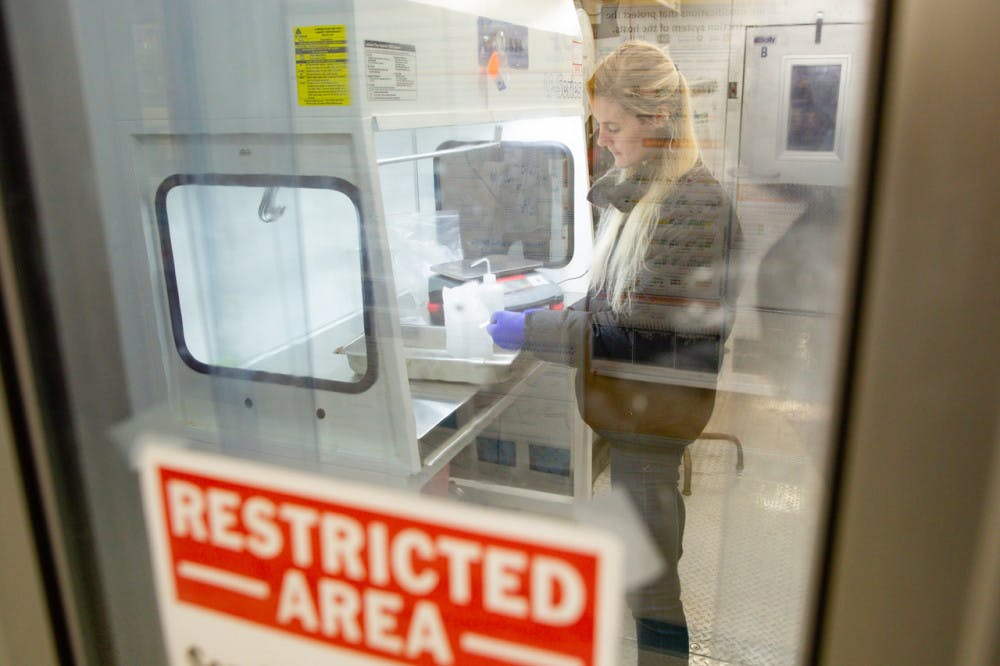Christina Davis traveled more than 8,000 miles in one day.
Davis, a 26-year-old UF microbiology and cell science doctoral student, wasn’t heading home Sunday for her Winter Break; she was headed to Antarctica.
Davis is one of 37 researchers from the U.S. who will spend two months studying the past, present and future of the Mercer Subglacial Lake, a lake beneath a glacier. The trip is funded by the National Science Foundation with the goal of learning about what microorganism life is like beneath a glacier, Davis said.
“There’s a lot to come out of it. For this Ph.D., there’s kind of a lot riding on it,” Davis said.
One of the things Davis will be responsible for is gathering samples of microbes, which are microscopic organisms that live beneath nearly one mile of ice, she said. Her goal is to find out what microbes do, including how they impact the environment and the climate.
The researchers will have to carefully extract the samples without them getting stuck in ice before the drilled hole freezes over again, Davis said. They will work for four days in a row then have a four-day break.
Geologists, micro-geologists and hydrologists on the team will date different sediments and map the movements of the glacier and meltwater, the water formed by a melting glacier. Each scientist plays an integral role in uncovering the story about life underneath glaciers, Davis said.
As the team arrives, there will be training sessions and group meetings to determine who will get which samples. For 14 days, Davis will spend her afternoons conducting experiments in the laboratory. Next, the team will fly out to the field site, which involves crossing the Ross Ice Shelf, Antarctica’s largest floating sheet of ice.
Then, they unpack the materials and get to work.
Brent Christner, a UF microbiology and cell science associate professor, said they will initially go to McMurdo Station, a research center, before flying 600 miles out to the middle of nowhere. At the station, they’ll get their samples and cargo ready.
Once they arrive, it will be just a few dozen researchers and their equipment. The next phase of the trip will be eight days of just sampling nonstop. They will do these intense 24-hour sampling operations for a little over a week, Christner said.
The U.S. is leading the way in researching more than 400 lakes that lie underneath Antarctica, Christner said. Five years ago, Christner was involved in the first effort to drill into the subglacial lakes.
Hundreds of pounds of material will be shipped by boat to Florida by the end of the trip, he said. The National Aeronautics and Space Administration is interested in learning about frozen environments on other planets based on this kind of research.
“There are about a dozen places in our solar system that have an ocean,” Christner said. “Earth is not the only (planet) with an ocean. It doesn’t even have the biggest one.”
Christner and Davis met in 2016 at UF. Davis already knew many of the techniques she would need to use in the field. She was the perfect choice, Christner said.
Davis, an Iowa-native, said she’s used to the cold. It will be summer in Antarctica, which she said is comparable to winter weather in Iowa.
The temperature will be around 10 to 20 degrees while Davis is there, but she said it can get much worse.
Davis has studied abroad in Spain, attended a conference in Australia and will now add her Antarctica trip to her resume. Traveling allows her to interact with scholars who ask new questions and share unique methods, she said.
“Definitely going to Antarctica, there’s going to be a lot of people from everywhere,” Davis said. “And it’s kind of a captive audience, being there on the ice.”
Contact Angela DiMichele at adimichele@alligator.org and follow her on Twitter at @angdimi
Christina Davis working in a microbiology and cell science lab in preparation for field work in Antarctica on Tuesday, November 20th, 2018.






